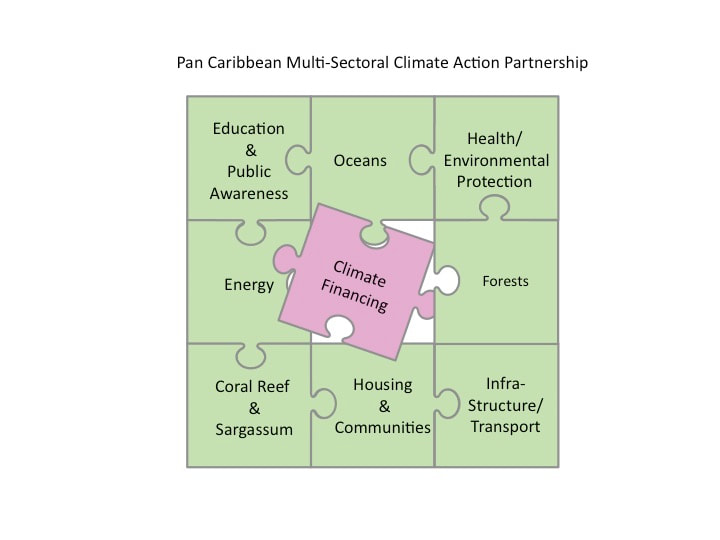|
10/10/2019 Formulating a Pan Caribbean Partnership for Climate Action: An exercise in Functional Cooperation - Why Not ?Read Now“The Caribbean experience makes abundantly clear that we must urgently reduce global emissions and work collectively to ensure that global temperature rise does not go beyond 1.5 degrees above pre-industrial levels ... cut greenhouse emissions by 45 per cent by 2030 and get to carbon neutrality by 2050.” [Antonio Gutteres UN Secretary General at the 40th Regular meeting of CARICOM Heads of Government in St Lucia July 2019]
Setting the Scene The UN Secretary General's message became even more potent in the aftermath of Hurricane Dorian that literally devastated Abaco and Grand Bahama Islands in The Bahamas. It was reinforced at the UN Climate Action Summit with its refrain that Climate Change poses an existential threat to many Small Island Developing States and Least Developed Countries and undermines sustainable development prospects for most. However, nowhere were these issues more dramatically illustrated as in the presentation to the UN Summit by Prime Minister Mia Mottley on behalf of the Alliance of Small Island States (AOSIS). This presentation carried in last week's blog post, highlighted the need to:
Making the Case for a Pan Caribbean Partnership These takeaways apply as much to advocacy for the AOSIS objectives within the global arena as to a Pan Caribbean Partnership for Climate Action. Previous instalments preceding this blog show that: the building blocks for a Pan Caribbean Partnership are already in place; Caribbean countries are among the most climate-vulnerable countries; their climate scientists led by researchers at UWI are in the forefront of developing science-based strategies for climate adaptation and mitigation through their participation in the IPCCC processes; they lack access to climate finance; and their interests are not fully represented at the international level. Hence, involvement in global cross cutting-multifaceted initiatives such as climate impacts research can strengthen the connections between the scientific assessments of climate change, vulnerability and adaptation, enable access to finance and help implement concrete projects. The Vision and Mission The Blog Innovation and Climate Resilience (9-19-19) established the building blocks for a Climate Action Partnership. It identified leading actors, institutions and priorities. It highlighted the vision and mission of the Partnership as defined by the Three (3) Ones Principle, One Regional Plan, One Coordinating Unit and One M&E implementation instrument. This principle provides the guidelines of a plan proposed by the Caribbean Community Climate Change Centre (5Cs) and endorsed by the CARICOM Heads of Government. See Delivering transformational change 2011-21: Implementing the CARICOM `Regional Framework for Achieving Development Resilient to Climate Change` Using the Regional Framework as a backdrop, we are proposing an outline for consideration. It hinges on four (4) pillars: (i) Knowledge for Climate Action; (ii) Clusters for Climate Resilience; (iii) Institutional Strengthening for Climate Adaptation and Mitigation; (iv) and Sustainable Financing for Climate Change Knowledge for Climate Action This pillar comprises four (4) components:
Clusters for building Climate Resilience This is intended to pursue the aspirational goal of making the Caribbean the first Climate resilient region in the World. It involves developing regional and interregional partnerships to facilitate:
Institutional Strengthening for Climate Change Responses This requires establishing clusters for climate action to foster the multidisplinary and multisectoral whole of government approaches with designated focal points:
Sustainable Financing for Climate Change This should be based on the development of a Regional Climate Action Plan. Access to finance remains one of the most important barriers to climate action. Going forward, financial instruments and innovative financing mechanisms must be leveraged to mobilize adequate climate finance. An enabling environment for private sector engagement and public-private collaborations must also be further enhanced to ensure the required pace and scale of Nationally Determined Conditions (NDC) for climate action. These require strong advocacy, political will and global solidarity:
Conclusion These are preliminary thoughts on the movement toward a Pan Caribbean Partnership for Climate Action. Is it necessary? Is it cost effective? Is there the climate leadership for this approach ? -- Why Not?
1 Comment
Haleema Ali-Sisbane (on behalf of Professor Karl Theodore)
10/11/2019 07:18:19 am
Dear Sir/Madam,
Reply
Leave a Reply. |
Details
AuthorEdward and Auriol Greene Directors, GOFAD. Archives
April 2022
Categories |
Global Frontier Site Links |
Contact InformationEmail: [email protected]
Twitter: @GofadGlobal |


 RSS Feed
RSS Feed
